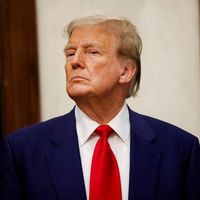Freedom House slams Iran for censoring online election criticism
Rights watchdog Freedom House ranked Iran as having the world’s third most repressive internet environment and lambasted the Islamic Republic for criminalizing online criticism to boost voter turnout and legitimize its presidential elections.
"(Authorities) criminalized any content that encouraged election boycotts or protests, or that criticized candidates ... (for) higher voter turnout to make the election seem legitimate, despite the arbitrary disqualification of most candidates," the group said in a report on Thursday.
The Iranian judiciary had warned that electoral laws prohibited candidates and their supporters from using foreign social media platforms, nearly all of which are blocked in the country, forcing the population to use Virtual Private Networks (VPNs) to bypass bans.
This was particularly evident in the lead-up to Iran’s snap presidential election, called after the sudden death of Ebrahim Raisi in a helicopter crash.
In June, the Iranian Press Supervisory Board issued a directive warning that violators of electoral rules would face severe punishment, including a sentence of 74 lashes.
The instructions specified that disseminating content aimed at “the boycott of the elections and the lowering of participation ... (or) organizing any form of unauthorized protest gathering, strike, or sit-in” would be considered a crime.
The election campaign involved a boisterous contest among the 80 registered candidates, six of whom were approved by Iran's unelected Guardian Council.
'Internet freedom repression'
The latest Freedom House report ranks Iran as the world's third most repressive country in terms of internet freedom, trailing only behind Myanmar and China, which jointly hold the first position.
Among Middle Eastern countries, Iran received the lowest overall score of 12 points on Freedom on the Net's 100-point scale behind Bahrain and Saudi Arabia.
Iran has a long history of stringent censorship, blocking tens of thousands of websites over the past two decades. Traditional media, literature, and cinema are also closely monitored, with content assessed for compliance with Islamic principles and political loyalty.
During his campaign, President Masoud Pezeshkian had pledged to lift internet filtering - a promise that resonated with millions of Iranians.
However, Pezeshkian recently ordered the Supreme Council of Cyberspace to crack down on anti-filtering software, leaving his supporters confused and disappointed as many Iranians still depend on VPNs to connect with the outside world and conduct business.
Reformist political activist Hassan Asadi-Zeidabadi expressed his frustration on social media, posting on X: “I can’t understand the meaning of this order about anti-filtering software and how it can help the removal of filtering.”
Last year, Freedom House cited a significant decline in Iran’s internet freedom in 2023, largely due to the government’s intensified efforts to quash protests linked to the Woman, Life, Freedom protests of 2022.
Sparked by the death of Mahsa Amini in police custody, the uprising was met with a violent crackdown and led to a marked drop in Iran’s internet freedom scores.







